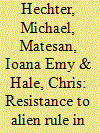|
|
|
Sort Order |
|
|
|
Items / Page
|
|
|
|
|
|
|
| Srl | Item |
| 1 |
ID:
145030


|
|
|
|
|
| Summary/Abstract |
Why are some countries prone to ethno-nationalist conflict, whereas others are plagued by class conflict? This is a question that has seldom been raised and rarely been examined empirically. This paper presents a social-structural theory to account for the variable incidence of these two forms of political instability. These two types of conflict result from distinct principles of group solidarity – ethnicity and class – and since each individual is simultaneously a member of an ethnic group (or many such groups) and a particular class, these two principles vary in the degree to which they are mutually exclusive or cross-cutting. The degree of economic stratification between groups and economic segmentation within them shapes the relative salience of each principle of group solidarity in any society and is associated with a characteristic form of political mobilization. In places where between-group inequalities are high, and within-group inequalities low, ethnicity should be the dominant principle of group solidarity and serve as the primary basis of group conflict. By contrast, in countries where between-group inequalities are low, and within-group inequalities high, class is more likely to serve as the dominant principle of group solidarity, and conflicts along class lines are more likely. We test these conjectures with data in over 100 countries on cross-cutting cleavages, ethnic war, and class conflict. The results are supportive of the theory, and provide evidence that how groups are stratified and segmented in societies shapes the type of civil war.
|
|
|
|
|
|
|
|
|
|
|
|
|
|
|
|
| 2 |
ID:
086738


|
|
|
|
|
| Publication |
2009.
|
| Summary/Abstract |
Although alien rule is widely assumed to be illegitimate, nationalist resistance to it varies across time and space. This article explores why there was greater nationalist resistance to Japanese colonial rule in Korea than Taiwan from the turn of the twentieth century to the end of World War II. Resistance to alien rulers requires both a supply of participants in nationalist collective action and a demand for national self-determination. The article assesses two principal propositions: (1) that the supply of participants increases to the degree that native elites are stripped of their traditional authority and offered few incentives to collaborate; and (2) that the demand for national self-determination decreases to the degree that alien rule is fair and effective. A comparative analysis of the effects of Japanese alien rule in Taiwan and Korea suggests that nationalist resistance is greater in the earliest phases of occupation, that the greater native elites' opportunities, the weaker the resistance to alien rule; and that the fairer the governance, the weaker the resistance to alien rule.
|
|
|
|
|
|
|
|
|
|
|
|
|
|
|
|
| 3 |
ID:
107258


|
|
|
|
|
|
|
|